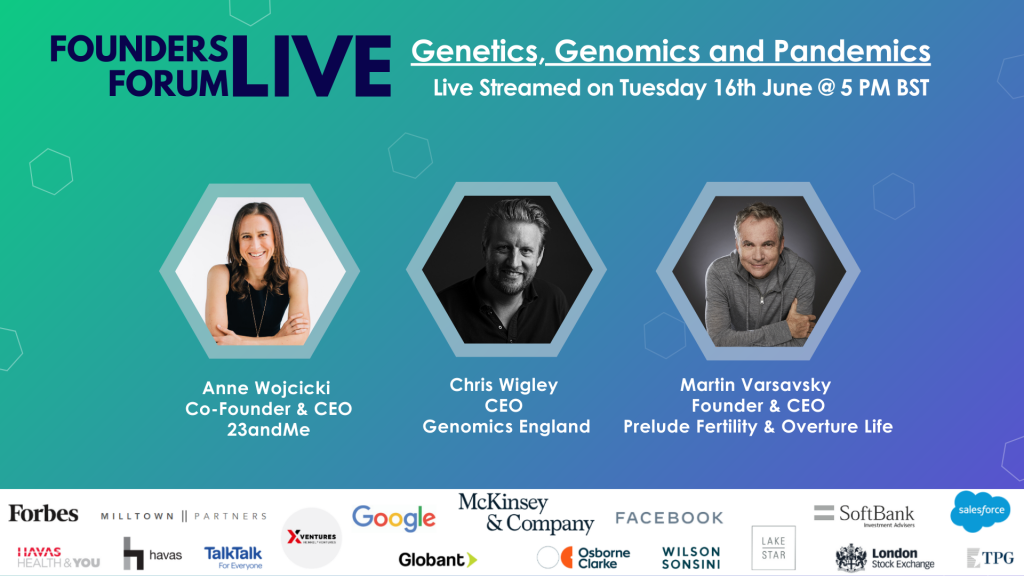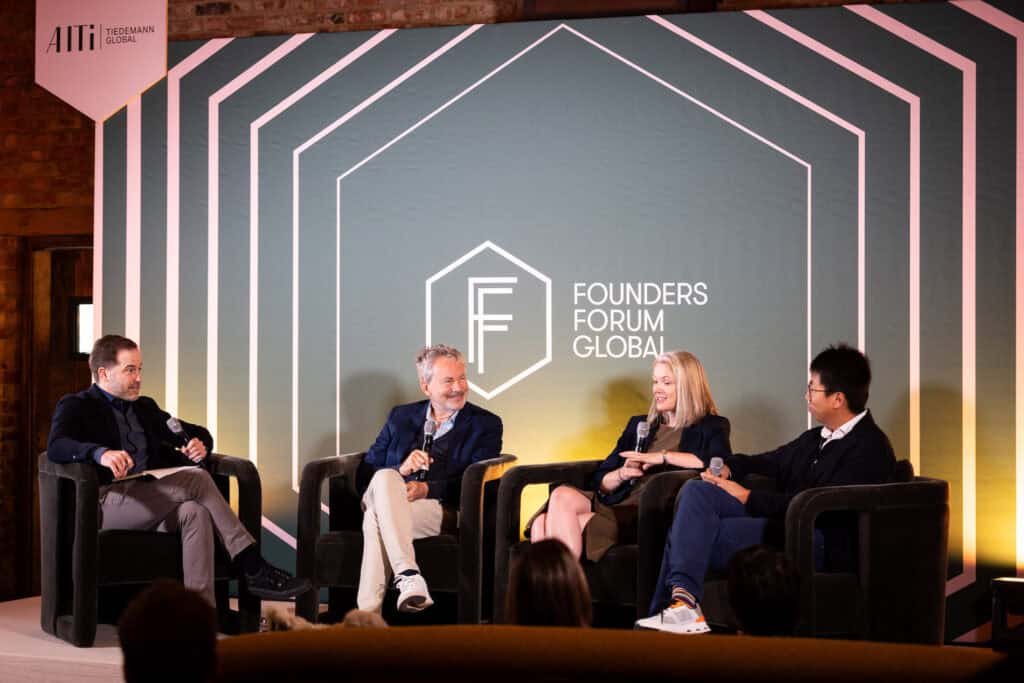Last updated on January 21, 2025
What do genetics and genomics have to do with pandemics? As part of the FF Live weekly digital series, we posed this question to our guest speakers during the height of the global health crisis on June 16th.
We would like to offer our thanks to Anne Wojcicki, Co-Founder & CEO, 23andMe, Chris Wigley, CEO, Genomics England, and guest moderator Martin Varsavsky, Founder & Chairman, Prelude Fertility for generously giving their time, alongside the 190+ Zoom attendees for their contributions.
This session, entitled “Genetics, Genomics, and Pandemics”, featured emerging research trends from the field of genomics and explored opportunities amongst healthcare players, both public and private, to collectively understand the genetic implications and devastating impact of the Covid-19 pandemic.

The following insights emerged from the discussion:
1. Understanding genetics is key to highlighting vulnerabilities to infectious diseases
“We realised one of the best things that we could do was try to understand some of the genetics of susceptibility and severity” – Anne Wojcicki, Co-Founder & CEO, 23andMe
- Genetics can highlight the vulnerability of individuals to particular viruses, including susceptibility and how severely they may suffer
- For example, 23andMe analysed research from 750,000 customers in April and concluded that those with Type O blood have a 9-18% decreased risk of susceptibility to Covid-19
- Genetic mutations can also mitigate the impact of diseases or provide immunity; for example, the presence of a mutated CCR5 gene has been suggested to provide natural autoimmunity to HIV
- Panellists agreed there is good reason to believe the same is true with genetic susceptibility to Covid-19, corroborated through the scale of severity in Covid responses across patients of similar demographics
- In line with this, Genomics England are curating cohorts of volunteers across 20,000 patients who suffered severely from Covid-19 (and were admitted to intensive care), and 15,000 who had mild symptoms or were asymptomatic, using the 100,000 initial Genomics England genomes as a control group
- In unpicking the differences between these cohorts, the aim is to better understand the severity of individual Covid responses (helping stratify those at risk), identify biomarkers to help with the development of vaccines, and build infrastructure to respond more nimbly to future waves of this pandemic
2. Collaboration between data collecting organisations (such as hospitals and international bodies) and genomics companies is necessary in order to reach meaningful conclusions on Covid-19
“It’s actually looking across all of these different sources [of data] that we really start to understand what’s going on” – Chris Wigley, CEO, Genomics England
- Collaboration across varied datasets including genomics, hospital data, prescription data, and imaging data (notably of the lungs) is needed to find correlations between medical history and Covid responses: for example, the discovery that long-term usage of a certain type of steroid hormone can reduce the severity of Covid
- Increased data sharing should also help better understand outlier Covid cases, such as 20-year olds with no underlying health conditions who have exhibited serious symptoms and required ventilator support
- Similarly, analysing those with unusually high resilience, such as the oldest woman in Spain who beat Coronavirus, is vital to understanding genetic susceptibility
- Companies such as 23andMe have a large amount of genomics data but are underpowered in terms of hospital data: combining their genomics data with other datasets will be more likely to lead to significant discoveries
- Genomics England have already begun collaborating internationally by anonymously aggregating datasets to find correlations between the genome and the virus
3. Transparency in privacy and data sharing is key to creating a positive public response
“When people are given the transparency and the choice, we actually have a lot of people who opt in to sharing their data” – Anne Wojcicki, Co-Founder & CEO, 23andMe
- When sharing data, privacy choices must be front and centre, and individuals need simple ways to opt in and opt out to help engender trust
- Covid-19 should not mask the fact that privacy is of the utmost importance: individuals deserve to know what they’ve opted into and how they can opt out, and in doing so, should be more likely to agree to vital data sharing
- To create trust, data sharing has to both feel like and be a choice, and not based on 50 pages of T&Cs written in a small font. In doing so individuals can be empowered to make informed choices about their health data
- Historically, individuals are more accepting in giving up some elements of privacy for the greater good (such as to combat terrorism): if people understand that sharing their data will benefit them, their families or society, they are generally more inclined to help
4. Behaviour is an important factor in the transmission and containment of Covid-19
“Such a small proportion of the population has actually been infected, we’re miles and miles from anything like the infamous herd immunity” – Chris Wigley, CEO, Genomics England
- In nations that are experiencing a decrease in Coronavirus cases, behavioural changes are believed to be playing an important role
- Given there has not yet been enough global exposure to provide “herd immunity”, and there have been mass gatherings occurring in many of these countries (largely driven by the Black Lives Matter demonstrations), behavioural factors are likely playing a role
- Panellists suggested that the lack of any significant increase in Covid cases post demonstrations could have been impacted by the outdoor nature of the protests and a younger demographic of attendees, as well as behavioural factors such as increased mask use and understanding of social distancing
5. Covid-19 has indirectly affected all other areas of healthcare, from digital adoption to rare disease
“A one to one relationship with a doctor is no longer the gold standard” – Anne Wojcicki, Co-Founder & CEO, 23andMe
- As populations have avoided in-person medical consultations during the Covid-19 pandemic, more and more onus has been placed on the individual to assess their own condition using a variety of digital resources
- To support this necessary change, healthcare has undergone an unprecedented digitisation: existing roadmaps that were looking at multi-year projects, such as launching remote consultations for primary care for GPs, have been completed in a matter of weeks
- Covid has also, however, prevented or postponed vital work on other diseases, such as pre existing collaborations between Genomics England and the NHS on cancer and rare diseases: this is due to lack of resources and a priority on Covid research
- Treatment for conditions such as infertility and skin cancer have been postponed whilst Covid has been prioritised in hospitals, which could lead to an increase in deaths from other untreated causes further down the line
—
Founders Forum is Europe’s pre-eminent entrepreneur network, gathering founders and senior executives alongside government and thought leaders to discuss, debate and collaborate on the impact of technology on industries and society.
#FFLive is the home for all Founders Forum’s virtual events, seeking to recreate the magic of Founders Forum wherever we are in the world. For more information on the FF Live series, follow us on LinkedIn and sign up to our newsletter, Founders News.
Founders Forum has also built a family of businesses, supporting entrepreneurs at every stage of their journey, across advisory, executive search, giving, diversity and inclusion, education and more.
 All Posts
All Posts


